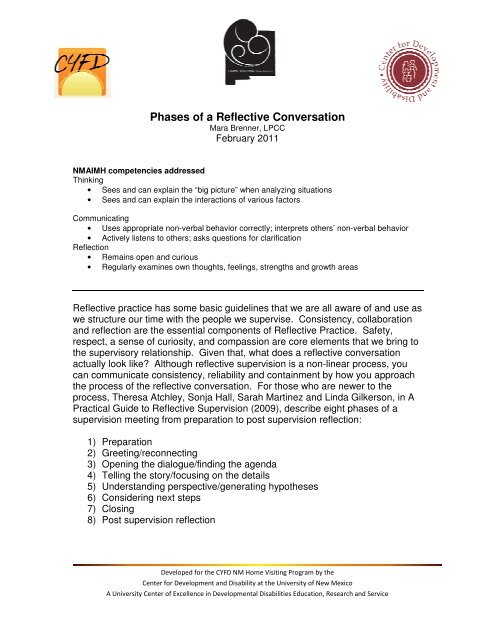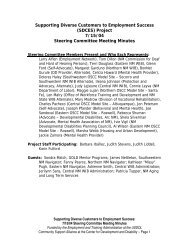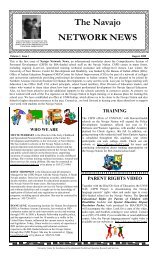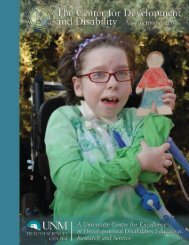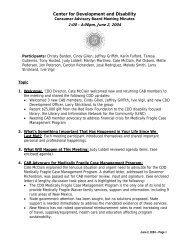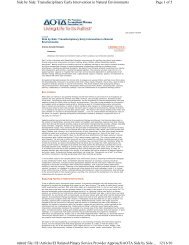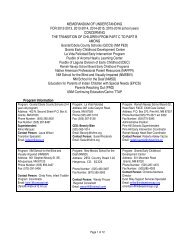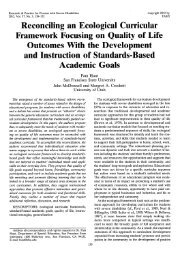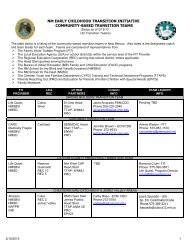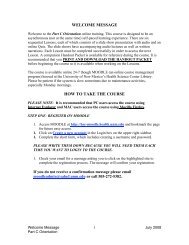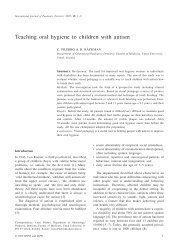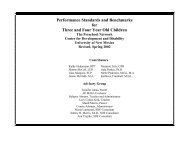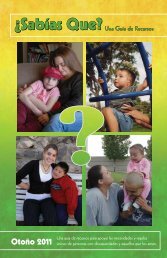Phases of a Reflective Conversation - Center for Development and ...
Phases of a Reflective Conversation - Center for Development and ...
Phases of a Reflective Conversation - Center for Development and ...
Create successful ePaper yourself
Turn your PDF publications into a flip-book with our unique Google optimized e-Paper software.
<strong>Phases</strong> <strong>of</strong> a <strong>Reflective</strong> <strong>Conversation</strong><br />
Mara Brenner, LPCC<br />
February 2011<br />
NMAIMH competencies addressed<br />
Thinking<br />
• Sees <strong>and</strong> can explain the “big picture” when analyzing situations<br />
• Sees <strong>and</strong> can explain the interactions <strong>of</strong> various factors<br />
Communicating<br />
• Uses appropriate non-verbal behavior correctly; interprets others’ non-verbal behavior<br />
• Actively listens to others; asks questions <strong>for</strong> clarification<br />
Reflection<br />
• Remains open <strong>and</strong> curious<br />
• Regularly examines own thoughts, feelings, strengths <strong>and</strong> growth areas<br />
<strong>Reflective</strong> practice has some basic guidelines that we are all aware <strong>of</strong> <strong>and</strong> use as<br />
we structure our time with the people we supervise. Consistency, collaboration<br />
<strong>and</strong> reflection are the essential components <strong>of</strong> <strong>Reflective</strong> Practice. Safety,<br />
respect, a sense <strong>of</strong> curiosity, <strong>and</strong> compassion are core elements that we bring to<br />
the supervisory relationship. Given that, what does a reflective conversation<br />
actually look like? Although reflective supervision is a non-linear process, you<br />
can communicate consistency, reliability <strong>and</strong> containment by how you approach<br />
the process <strong>of</strong> the reflective conversation. For those who are newer to the<br />
process, Theresa Atchley, Sonja Hall, Sarah Martinez <strong>and</strong> Linda Gilkerson, in A<br />
Practical Guide to <strong>Reflective</strong> Supervision (2009), describe eight phases <strong>of</strong> a<br />
supervision meeting from preparation to post supervision reflection:<br />
1) Preparation<br />
2) Greeting/reconnecting<br />
3) Opening the dialogue/finding the agenda<br />
4) Telling the story/focusing on the details<br />
5) Underst<strong>and</strong>ing perspective/generating hypotheses<br />
6) Considering next steps<br />
7) Closing<br />
8) Post supervision reflection<br />
Developed <strong>for</strong> the CYFD NM Home Visiting Program by the<br />
<strong>Center</strong> <strong>for</strong> <strong>Development</strong> <strong>and</strong> Disability at the University <strong>of</strong> New Mexico<br />
A University <strong>Center</strong> <strong>of</strong> Excellence in <strong>Development</strong>al Disabilities Education, Research <strong>and</strong> Service
Preparation is <strong>for</strong> you – to get yourself ready to fully be with the person you are<br />
about to talk with. Clear your desk, turn <strong>of</strong>f your phone, etc.; you may want to<br />
even review your notes from your last supervision meeting.<br />
Reconnecting is a transitional piece – it’s a brief conversation that brings the<br />
supervisee from where they’ve just been to the present so you both can be in this<br />
supervision time together.<br />
Opening the dialogue is where you invite the beginning <strong>of</strong> the process. “What’s<br />
on your mind today”?, or “Where would you like to start”, or “What would you like<br />
to focus on today” are invitations to your supervisee. Your job is then to listen.<br />
Telling the story <strong>and</strong> focusing on the details is the next step once a topic has<br />
been identified. “What happened?”, “What was said?”, “What did you notice”? all<br />
encourage your supervisee to construct the story <strong>of</strong> the family scenario. With<br />
your curious questioning, your supervisee may possibly become aware <strong>of</strong> her<br />
own attitudes <strong>and</strong> reactions within a given situation. This is not the time to solve<br />
problems or make things okay. This is the opportunity to hear what is going on<br />
from the supervisee’s point <strong>of</strong> view.<br />
Underst<strong>and</strong>ing perspectives <strong>and</strong> generating hypotheses is another part <strong>of</strong> the<br />
collaborative process. Together, you begin to wonder – possibly about how the<br />
mom feels while watching her child or what it is like <strong>for</strong> the child to have mom<br />
respond that way. As this collaborative process continues, hypotheses can be<br />
generated in a curious <strong>and</strong> exploring manner. The supervisee is supported to<br />
reflect on her own position <strong>and</strong> to toss around other perspectives.<br />
Considering next steps comes after you have gathered in<strong>for</strong>mation <strong>and</strong><br />
<strong>for</strong>mulated some potential hypotheses. This step helps to contain <strong>and</strong> organize<br />
what the supervisee has gleaned from the discussion thus far <strong>and</strong>, with your<br />
questions <strong>and</strong> support, come up with a potential plan <strong>for</strong> the next home visit.<br />
Closing is an important piece <strong>of</strong> any discussion as it acknowledges what’s<br />
occurred so far <strong>and</strong> confirms plans <strong>for</strong> the next supervision meeting.<br />
Post supervision reflection is an <strong>of</strong>ten overlooked component <strong>and</strong> yet is a vital<br />
one. Taking a few moments to reflect on key themes, supervisee’s level <strong>of</strong><br />
engagement <strong>and</strong> your own feelings related to the session allows <strong>for</strong> a more<br />
complete sense <strong>of</strong> closure <strong>for</strong> you <strong>and</strong> readiness to move on to your next task.<br />
An Idea To Try…<br />
Whether you are new to reflective practice or a seasoned reflective supervisor, at<br />
your next supervision session, pay attention to the phases <strong>of</strong> your conversation.<br />
How do you start your session? Do you follow a certain routine in how you<br />
2
proceed? Do your steps match those listed above? Do you make time to reflect<br />
“post supervision”?<br />
References/Additional Resources<br />
Gilkerson, Linda, Scott Heller, Sheryl. (2009) A Practical Guide to <strong>Reflective</strong> Supervision<br />
Washington, DC : Zero to Three<br />
3


